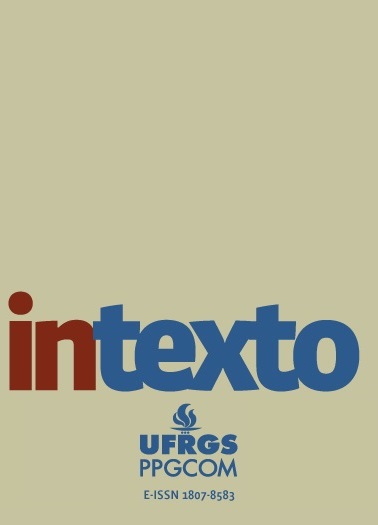New and old Diasporas: a cross-cultural communication between Senegalese and Arab-Brazilians in southern Brazil.
DOI:
https://doi.org/10.19132/1807-8583202152.104760Keywords:
Migrations. Contemporary Culture. Religion. New technologies. Diaspora.Abstract
The article brings reflections from a communicational study on socio-cultural relations between the recent Senegalese immigration in the southern region of Rio Grande do Sul, started in the second decade of 2000, and the Arab-Brazilians living in Brazil since the beginning of the last century. The theoretical basis for this study is mainly on the assumptions of Muniz Sodré, Stuart Hall and Jacques Rancière. A field research was carried out with participant observation and semi-structured interviews with representatives of both communities. We observed that the communicational interactions proved to be possible and active between the communities, with aspects of collaboration, understanding, as well as disagreements and different appropriations of media uses and practices.
Downloads
References
ASSOCIAÇÃO DOS SENEGALESES DE PORTO ALEGRE. 2018. Facebook: adspoa. Disponível em: https://www.facebook.com/adspoa/. Acesso em: 22 out. 2019.
ASSOCIAÇÃO DOS SENEGALESES DO RIO GRANDE. 2017. Facebook: nagnu.ande.liguey. Disponível em: https://www.facebook.com/nagnou.ande.liguey/ Acesso em: 13 out. 2019.
BRIGNOL, Liliane Dutra; COSTA, Nathália. Diáspora senegalesa e mediação tecnológica: entre tempos e lugares na observação do Magal de Touba. Contracampo, Niterói, v. 37, n. 1, 2018.
CAVALCANTI, Leonardo; OLIVEIRA, Antônio Tadeu; MACÊDO, Marília Fernandes Rodrigues de; PEREDA, Lorena del Pilar. Resumo Executivo. Imigração e Refúgio no Brasil. A inserção do imigrante, solicitante de refúgio e refugiado no mercado de trabalho formal. Observatório das Migrações Internacionais; Ministério da Justiça e Segurança Pública / Conselho Nacional de Imigração e Coordenação Geral de Imigração Laboral. Brasília, DF: OBMigra, 2019.
DIAS, Eduardo Costa. Senegal: confrarias, contrato social e modernidade. Janus, OBSERVARE – Observatório de Relações Exteriores da Universidade Autónoma de Lisboa, Lisboa, Portugal, 2007.
ECOVIX demite 32 mil trabalhadores do Polo Naval de Rio Grande. 2016. Disponível em:
http://www.riogrande.rs.gov.br/opolonaval/index.php/noticias/detalhes+29b,,ecovix-demite-32-mil-trabalhadores-do-polo-naval-de-rio-grande-.html. Acesso em: 22 nov. 2019.
ELHAJJI, Mohammed; ESCUDERO, Camila. Webdiáspora: Migrações, TICs e memória coletiva. In: SODRÉ, Muniz et al. (org.). Diásporas urbanas: migrantes, viajantes e transeuntes. Goiania: Gráfica UFG, 2015, p. 19-41.
ELHAJJI, Mohammed. Rio de Janeiro – Montreal: Conexões transnacionais / Ruídos interculturais. In COGO, Denise; ELHAJJI, Mohammed; HUERTAS, Amparo (eds.): Diásporas, migrações, tecnologias da comunicação e identidades transnacionais, Bellaterra:
Universitat Autònoma de Barcelona, 2012, p. 31-42.
GILROY, Paul. O Atlântico Negro: modernidade e dupla consciência. São Paulo: Ed. 34, 2001.
HALL, Stuart. Da diáspora: identidades e mediações culturais. Organização Liv Sovik. Belo Horizonte: Editora UFMG; Representação da UNESCO no Brasil, 2003.
HALL, Stuart. Cultura e representação. Rio de Janeiro: Ed. PUC-Rio: Apicuri, 2016.
HEIL, Tilmann. Uma infraestrutura muçulmana de chegada no Rio de Janeiro. REMHU, Revista Interdisciplinar de Mobilidade Humana, Brasília, v. 26, n. 52, 2018, p. 111-129.
JUNG, Philipp Roman. Desenvolvimento de processos migratórios do Senegal para o Brasil e suas alterações. In: TEDESCO, João Carlos (org.). Imigração senegalesa: múltiplas dimensões. v. 2. Porto Alegre: EST Edições, 2019, p. 45-76.
LACOMBA, Joan. Inmigrantes senegaleses, Islam y cofradías. Revista Internacional de Sociología, Córdoba, n. 29, maio/ago. 2001.
MARTINO, Luís Mauro Sá. Mídia, Religião e Sociedade: das palavras às redes digitais. São Paulo: Paulus, 2016.
MONTENEGRO, Silvia. As Comunidades Muçulmanas na Tríplice Fronteira: Identidades Religiosas, Contextos Locais e Fluxos Transnacionais. In: Reunião Brasileira De Antropologia, 26a, 2008, Porto Seguro. Anais [...], Porto Seguro, 2008.
ORGANIZAÇÃO INTERNACIONAL PARA MIGRAÇÕES, World Migration Report 2020. Disponível em: https://publications.iom.int/books/world-migration-report-2020. Acesso em: dez. 2020.
PINTO, Paulo Gabriel Hilu da Rocha. Árabes no Rio de Janeiro: uma identidade plural. Rio de Janeiro: Cidade Viva, Instituto Cultural Cidade Viva, 2010.
RANCIÈRE, Jaques. O Desentendimento: política e filosofia. São Paulo: Editora 34, 2018.
ROSSA, Juliana. Seguidores de Cheikh Ahmadou Bamba: apontamentos etnográficos sobre a vivência da fé no contexto migratório de senegaleses Mourides. In: TEDESCO, João Carlos (org.). Imigração senegalesa: múltiplas dimensões, v. 2. Porto Alegre: EST Edições, 2019, p.287-312.
ROBERTO, Simone Assis Alves; PINHEIRO, Patrícia dos Santos. Do Senegal a Pelotas, RS:
Migração, Identidade e Violência. Século XXI. Revista de Ciências Sociais, Fortaleza, v. 9, n. 1, p. 123-158, jan./jun. 2019
SAMBE, Bakary. Senegal: un islam local em épocas de globalización religiosa. Janus Anuário, OBSERVARE – Observatório de Relações Exteriores da Universidade Autónoma de Lisboa, Lisboa, Portugal. 2007.
SAYAD, Abdelmalek. Imigração ou os Paradoxos da Alteridade. São Paulo: EDUSP, 1998.
SECRETARIA NACIONAL DE JUSTIÇA. Refúgio em Números. 3ª. ed. Brasília, 2018. Disponível em:https://www.justica.gov.br/seus-direitos/refugio/anexos/refasgio-em nasmeros_1104.pdf. Acesso em: 22 out. 2020.
SODRÉ, Muniz. Pensar Nagô. Rio de Janeiro. Vozes, 2017.
SODRÉ, Muniz. Ciência do Comum. Rio de Janeiro: Vozes, 2014.
SODRÉ, Muniz. As estratégias sensíveis. Afeto, Mídia e Política. Petrópolis: Vozes, 2006.
TEDESCO, João Carlos. Apresentação. In: TEDESCO, João Carl (org.) Imigração senegalesa: múltiplas dimensões. v. 2. Porto Alegre: EST Edições, 2019, p. 9-20.
Downloads
Published
How to Cite
Issue
Section
License
Copyright (c) 2021 Guilherme Oliveira Curi, Liliane Dutra Brignol

This work is licensed under a Creative Commons Attribution-NonCommercial 4.0 International License.
The copyright of works published in this journal belong to the authors, and the right of first publication is conceded to the journal. Due to the journal being of open access, the articles are of free use in research, educational and non-commercial activities.
Therefore, the journal uses the License Creative Commons Attribution (CC BY-NC 4.0), which allows sharing of work with acknowledgment of authorship.
Self-archiving (repository policy): authors are allowed to deposit all versions of their work in institutional or thematic repositories without embargo. It is requested, whenever possible, that the full bibliographic reference of the version published in Intexto (including the DOI link) be added to the archived text.
Intexto does not charge any article processing fees (article processing charge).















